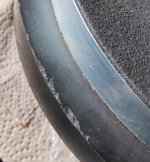I have concerns that this would penetrate into the VC or PP otherwise on surfaces this might be worth to try.It might help if you find what exactly the product of the corrosion is. The brown residue is probably rust (oxide) but the white one looks like a chloride, from sea water perhaps ... ? It is also significantly less at places where the diaphragm sits, suggesting some kind of surface exposure etc.., highly unlikely to have penetrated any deeper into the piece .
I feel like trying this:
View attachment 1334292
You could use a microscope like the one in the video:currently the intention is to document the degree of oxidation in the VC gap and that it was not clean.
Have you opened the bug screen on the other side ? The corrosive substance must have entered that way, cutting across the phase plug to reach the concave side of the diaphragm (also corroded), as seen in your pictures (#1). Since this route doesn't cover the air gap, it is possibly unaffected by the corrosive substance, only rusted.
The magnet might be alright but if you see carefully, there're small cracks that're still developing.
Can't you return them, I mean, is it worth the trouble ?
Last edited:
@newvirus2008
That is my intention to return them as I think as you: the time needed to clean the drivers (and the result is uncertain) is not worth the spent as time is the most valuable thing we have. But the seller does not feel responsible in any way, although he has not ruled out material defects. Claims I destroyed the drivers by opening them, and also destroyed the centering of the diaphragm. I have more and more doubts that the seller didn't know anything about the water damage. In any case, he categorically rejects the withdrawal. I'm currently checking whether I can file a police report because I feel like I've been fraudulently deceived.
To look from the driver exit side would be a further task. This driver has a metal shim of about 10mm with felt and the protection mesh is below the feld. So at first the felt has to be removed to remove this protection mesh. The phase plug is then about 10mm below the mesh and hard to see what is going even with bright light.
That is my intention to return them as I think as you: the time needed to clean the drivers (and the result is uncertain) is not worth the spent as time is the most valuable thing we have. But the seller does not feel responsible in any way, although he has not ruled out material defects. Claims I destroyed the drivers by opening them, and also destroyed the centering of the diaphragm. I have more and more doubts that the seller didn't know anything about the water damage. In any case, he categorically rejects the withdrawal. I'm currently checking whether I can file a police report because I feel like I've been fraudulently deceived.
To look from the driver exit side would be a further task. This driver has a metal shim of about 10mm with felt and the protection mesh is below the feld. So at first the felt has to be removed to remove this protection mesh. The phase plug is then about 10mm below the mesh and hard to see what is going even with bright light.
Last edited:
A suggestion to all is in any case to request pictures of a driver with the back cap removed to see the conditions in the back chamber and also pictures of the contact area with the horn.
The usual method for cleaning is folded over masking tape, the magnetic gap wants to retain ferrite chips and magnetic particles.Sweep around three times with folded paper to investigate the VC gap. This is looking like serious corrosion more the outer side:
View attachment 1334286 View attachment 1334287 View attachment 1334288
Even after the third run, it does not look better.
I've been surprised how much magnetic stuff is in "ordinary" dirt.
Since rust expands outward, using fine 240-500 grit wet emery cloth to start with will be much faster than masking tape.
As I mentioned in the previous link, CorrosionX is a really good product for eliminating corrosion and preventing it in the future. It will still require cleaning, but if you spray it on and wait a few hours, you can eliminate 50 to 75% of the cleanup work. It prevents future bi-metallic corrosion, which is a typical problem in drivers, where there is steel, aluminum, titanium and alternating current.
Add moisture from condensation (or drinks funneled in

CorrosionX can be used on the diaphragm and voice coil too.
https://www.corrosionx.com/products/corrosionx?variant=44230643220725
I've cleaned up drivers that look far worse than yours, crystalline structures reaching from the diaphragm to the back cover foam.
Didn't have as accurate test equipment as we do now, but the response was within the usual unit to unit variation after cleanup and re-alignment of the diaphragm.
Could be more than an hour of work per driver.
Art
Last edited:
That doesn't have any effect on how the driver performs. However, those chipped off bits will affect its resell value greatly. Especially on vintage drivers where its condition represents most of its value.Can someone assess if the broken edges of the magnet ring are of any concern?
View attachment 1334293
I would guess that this is a minor issue?
- Home
- Loudspeakers
- Multi-Way
- I have a pair of very dirty vintage drivers that need restoration, any suggestions?
